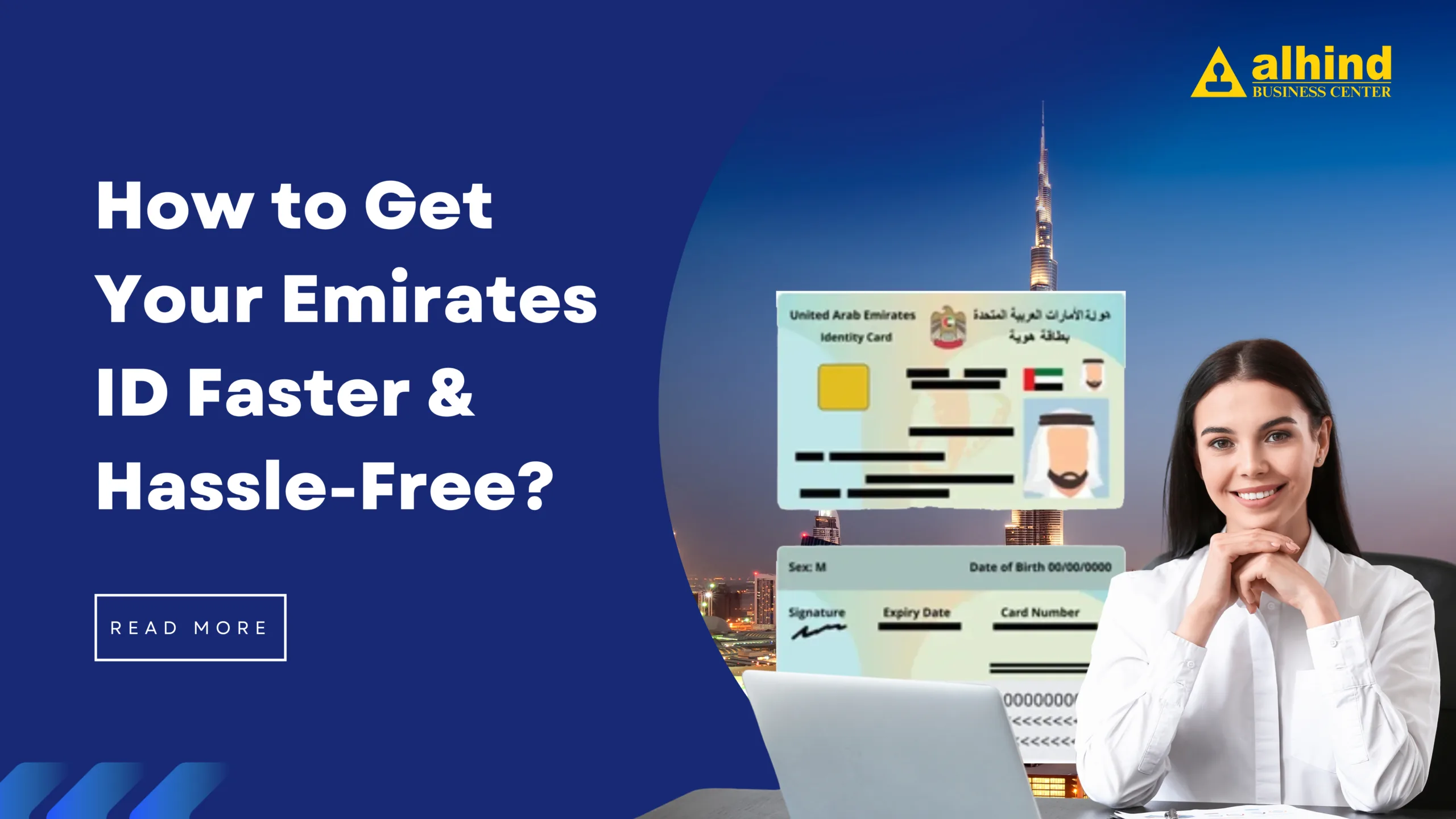Table of Contents
Dubai. The name conjures images of shimmering skyscrapers, bustling trade routes, and a vibrant entrepreneurial spirit. It’s no secret that the city has cemented its position as a global business hub, attracting investors and corporations from every corner of the world. With its strategic geographical location bridging East and West, state-of-the-art infrastructure, and a favorable tax environment, Dubai offers unparalleled opportunities for businesses looking to expand their reach.
At Alhind Business Center (Alhind BC), we understand that setting up shop in Dubai goes beyond simply registering a company. A crucial step in establishing a solid financial foundation is opening a corporate bank account. This isn’t merely a formality; it’s the gateway to seamless transactions, efficient financial management, and enhanced credibility in the local market. With our expertise and insider knowledge of UAE banking procedures, Alhind BC ensures that your business can navigate this process smoothly and successfully.
Why is a Corporate Bank Account so Important?
- Legitimacy: A dedicated corporate account separates your business finances from personal funds, establishing a clear legal distinction.
- Efficiency: Streamlines payment processing, expense tracking, and financial reporting.
- Access to Financial Services: Opens doors to loans, credit facilities, and other financial products tailored for businesses.
- International Transactions: Facilitates international trade and cross-border payments, essential for businesses operating in a globalized market like Dubai.
- Enhanced Credibility: Demonstrates professionalism and builds trust with clients, suppliers, and partners.
This comprehensive guide will walk you through the entire process of opening a corporate bank account in Dubai. From selecting the right bank and preparing the required documents to navigating UAE banking regulations, Alhind BC has you covered every step of the way. Whether you’re a multinational corporation or a budding startup, this guide will give you the knowledge and insights you need to open your account smoothly and successfully.
Why Open a Corporate Bank Account in Dubai?
Opening a corporate bank account in Dubai offers businesses a secure, efficient, and globally respected financial platform that is essential for successful operations. It enables seamless management of finances, keeps business funds separate from personal accounts, and ensures transparent accounting, which is crucial for tax reporting and regulatory compliance. At Alhind BC, we help you navigate this process with ease, ensuring that every step is handled efficiently and in full compliance with UAE regulations. A corporate account also builds credibility and professionalism, reassuring clients, suppliers, and partners of your company’s legitimacy and financial integrity. Additionally, Dubai’s advanced banking sector provides convenient access to international transactions, multi-currency accounts, and digital banking services advantages which we at Alhind make readily accessible to our clients. Establishing such an account helps lay a solid foundation for business growth in one of the world’s leading commercial hubs, unlocking opportunities for credit, investment, and long-term expansion.
Want to know more about trade licences? Learn the full process in our step-by-step blog on how to start a business in the UAE.
The compelling advantages of opening a corporate bank account in Dubai are numerous:
- Access to a Booming Economy: Dubai’s robust and rapidly growing economy attracts entrepreneurs from across the globe, providing ample opportunities for business growth and investment.
- Strategic Location: As a global gateway, Dubai’s location bridges East and West, offering seamless access to markets in the Middle East, Africa, Asia, and Europe, which is ideal for companies with international ambitions.
- Favorable Banking Conditions: Dubai’s banking sector is renowned for reliability, advanced digital platforms, multi-currency account options, and access to a range of local and international banks. This ensures convenience and flexibility in managing business finances.
- Robust Financial Services: Businesses benefit from a regulated banking environment, world-class financial infrastructure, and global banking connectivity—including easy international transactions, credit facilities, and modern payment solutions.
- Tax Benefits: Dubai offers a highly tax-efficient regime featuring zero personal income tax and only a limited corporate tax, helping companies maximize profits and enhance tax compliance.
- Political Stability: The UAE’s stable governance and regulatory environment provide security for investors, making Dubai a trusted base for regional headquarters or expansion.
- Modern Infrastructure: Dubai features state-of-the-art business infrastructure, cutting-edge technology, and efficient systems, reflected in both its physical and digital banking services. Businesses can conveniently open and manage accounts online, saving time and enhancing flexibility.
- Ease of Doing Business: The streamlined regulatory system, investor-friendly policies, and transparent business processes in Dubai simplify company formation, bank account opening, and ongoing business management, reducing administrative burdens and boosting competitiveness.
Real-life Examples:
- Multinational Corporations: Many multinational corporations, such as Siemens, Nestlé, and Unilever, have established a strong presence in Dubai and utilize local corporate bank accounts to manage their regional operations.
- Startups: Numerous tech startups are choosing Dubai as their base, leveraging the city’s vibrant ecosystem and access to funding. A local bank account is essential for receiving investments and managing expenses.
- Trading Companies: Dubai’s strategic location and free trade zones make it a hub for trading companies. A corporate bank account allows these companies to efficiently manage import/export payments and currency exchange transactions.
Step-by-Step Guide to Opening a Corporate Bank Account in Dubai
Opening a corporate bank account in Dubai can be straightforward with the right guidance and preparation. This guide will take you through each step, making the process simple and easy to follow.
Step 1: Choose the Right Type of Corporate Bank Account
Before you even approach a bank, it’s crucial to determine which type of corporate bank account best suits your business needs. The most common types include:
- Savings Account: A savings account is designed for storing funds and earning interest. While it may offer limited transaction capabilities, it’s a good option for setting aside funds for future investments or emergencies.
- Suitable for: Businesses looking to earn interest on surplus funds and maintain a safety net.
- Current Account (Checking Account): This is the most basic type of account, designed for day-to-day transactions. It allows you to deposit and withdraw funds, make payments, and manage your cash flow. Current accounts typically offer checkbooks and debit cards.
- Suitable for: Businesses with high transaction volumes, requiring frequent deposits and withdrawals.
- Fixed Deposit Account: A fixed deposit account allows you to deposit a lump sum of money for a fixed period of time, earning a higher interest rate than a savings account. However, you typically cannot withdraw the funds before the maturity date without incurring penalties.
- Suitable for: Businesses with long-term surplus funds and a predictable cash flow, seeking higher returns on their investments.
Case Studies:
- Scenario 1: E-commerce Startup: A new e-commerce startup requires a current account for processing online payments, managing supplier invoices, and paying employee salaries. They need an account with low transaction fees and integration with popular payment gateways.
- Scenario 2: Real Estate Company: A real estate company wants to set aside funds for future property acquisitions. They choose a savings account to earn interest on their reserves while maintaining liquidity.
- Scenario 3: Manufacturing Company: A manufacturing company with a large cash surplus decides to invest in a fixed deposit account to maximize returns over 3 years.
Read our blog to find out whether Mainland, Free Zone, or Offshore is right for you — and discover the pros and cons of each setup in Dubai.
Step 2: Select the Right Bank
Choosing the right bank is a critical decision that can significantly impact your business operations. Consider the following factors when making your selection:
- Banking Fees: Compare account opening fees, monthly maintenance fees, transaction fees, and other charges. Look for banks with transparent fee structures and competitive rates.
- Customer Support: Evaluate the quality of customer support offered by the bank. Do they offer 24/7 support? Are they responsive and helpful?
- Service Availability: Ensure that the bank has branches and ATMs conveniently located for your business operations. If you primarily conduct business online, assess the bank’s online banking platform and mobile app.
- Range of Services: Determine if the bank offers the specific services you need, such as trade finance, cash management, or investment solutions.
- Reputation and Stability: Choose a bank with a strong reputation and a proven track record of financial stability.
- Specialized Services: Some banks offer specialized services for specific industries, such as real estate, healthcare, or technology. Consider a bank with expertise in your sector.
Comparative Table of Top Banks:
| Bank | Strengths | Consumer Reviews |
|---|---|---|
| Emirates NBD | Extensive branch network, comprehensive services, strong online banking platform | Generally positive reviews, praised for convenience and service offerings. Some complaints about long wait times at branches. |
| First Abu Dhabi Bank (FAB) | Strong international presence, competitive rates, innovative financial solutions | Mixed reviews, praised for international capabilities and competitive rates. Some complaints about complex procedures and inconsistent customer service. |
| Mashreq Bank | Excellent customer service, fast account opening process, and innovative digital banking | Highly rated for customer service and digital banking experience. Some complaints about the limited branch network. |
| RAKBANK | SME-focused, competitive rates, streamlined processes | Positive reviews from SMEs praised their understanding of small business needs and their efficient processes. Some complaints about limited services for larger corporations. |
| Al Maryah Community Bank LLC | Digital Account Opening, 24x7 Digital Banking Access, Innovative Technology | New bank, fewer reviews available, but focus on digital experience and customer support is promising. Potential for faster processes and more personalized service. |
| Wio Bank PJSC | Fully digital process, Multi-User Access, Advanced security | Strong App Store rating (4.8), indicating positive user experience. Known for catering to SMEs and startups with a focus on streamlined processes. A good option for tech-savvy businesses. |
Unique Services and Advantages:
- Emirates NBD: Offers a comprehensive suite of services, including Islamic banking, wealth management, and brokerage services.
- First Abu Dhabi Bank (FAB): Has a strong international presence and offers specialized services for trade finance and cross-border transactions.
- Mashreq Bank: Known for its innovative digital banking solutions and its focus on customer experience.
- RAKBANK: Caters specifically to SMEs and offers tailored financial solutions to support their growth.
- Al Maryah Community Bank LLC: Standouts include digital account opening, 24/7 access, and innovative technology tailored for modern businesses.
- Wio Bank PJSC: Key strengths are the fully digital account setup, multi-user access for team collaboration, and robust security measures, making it ideal for startups and SMEs.
Step 3: Documentation Required for Corporate Bank Account Opening
Once you’ve selected a bank, the next step is to gather the necessary documents. The specific requirements may vary depending on the bank and the type of company, but generally, you’ll need the following:
- Company Documents:
- Trade License (Original and Copy)
- Certificate of Incorporation
- Memorandum of Association (MOA)
- Articles of Association (AOA)
- Share Certificate
- Board Resolution authorizing the opening of the bank account
- Company Profile
- Shareholder and Director Documents:
- Passport Copies (for all shareholders and directors)
- Visa Copies (for all shareholders and directors, if applicable)
- Emirates ID Copies (for all shareholders and directors, if applicable)
- Proof of Address (Utility bill or tenancy contract)
- Curriculum Vitae (CV) or Resume (for all directors)
- Other Documents:
- Company Bank Statements (for the past 6 months, if available)
- Office Lease Agreement
- Supplier and Customer Contracts (May be required by some banks)
- Business Plan (May be required by some banks)
- Ultimate Beneficial Owner (UBO) Declaration
Tips for International Clients:
- Translations: All documents that are not in English or Arabic must be translated by a certified translator.
- Notarization: Certain documents may need to be notarized and attested in your home country and in the UAE. Check with the bank for specific requirements.
- Embassy Attestation: Depending on the document and the bank’s requirements, you may need to have the documents attested by the UAE embassy or consulate in your home country.
Step 4: Submit Your Application & Undergo Compliance Checks
Once you’ve gathered all the required documents, you can submit your application to the bank. The submission process typically involves:
- Completing the Bank’s Application Form: Fill out the application form accurately and completely, providing all the required information.
- Submitting the Documents: Submit all the required documents to the bank, either in person or electronically, depending on the bank’s procedures.
- Attending an Interview: Some banks may require you to attend an interview with a bank representative to discuss your business and your banking needs.
- Undergoing Compliance Checks: The bank will conduct thorough compliance checks to ensure that your business complies with all applicable regulations, including Know Your Customer (KYC) and Anti-Money Laundering (AML) regulations. This may involve verifying your identity, checking your business against sanctions lists, and assessing your risk profile.
Importance of Compliance:
- KYC (Know Your Customer): Banks are required to verify the identity of their customers to prevent fraud and money laundering.
- AML (Anti-Money Laundering): Banks are required to implement measures to prevent their services from being used for money laundering or terrorist financing.
Advice on Avoiding Pitfalls:
- Accurate Information: Ensure that all information provided in your application is accurate and consistent.
- Complete Documentation: Provide all the required documents in the correct format.
- Transparency: Be transparent about your business activities and your sources of funds.
- Compliance: Comply with all applicable regulations and cooperate fully with the bank’s compliance checks.
- Professional Assistance: Consider seeking professional assistance from a business consultant or legal advisor to ensure that you meet all the requirements.
Step 5: Account Approval & Activation
After submitting your application and undergoing compliance checks, the bank will review your application and make a decision. The approval process can take anywhere from a few days to a few weeks, depending on the bank and the complexity of your business.
Realistic Timeline:
- Fastest approvals by Mashreq Bank and RAKBANK: 7-10 days
- Standard Timeframe for LLC or Free Zone companies: Generally takes 2 to 4 weeks.
- Offshore accounts typically take longer due to stricter compliance.
What Happens After Activation:
- You will receive your account details, including your account number, IBAN, and SWIFT code.
- You can then start depositing funds into your account and using it for your business transactions.
- The bank will provide you with access to their online banking platform and mobile app.
Initial Setup Tips
- Set Up Online Banking: Familiarize yourself with the bank’s online banking platform and mobile app.
- Order Checkbooks and Debit Cards: If you need them, order checkbooks and debit cards for your account.
- Inform Your Suppliers and Customers: Notify your suppliers and customers of your new bank account details.
- Update Your Company Records: Update your company records with your new bank account details.
- Set Up Payment Processing: Integrate your bank account with your payment processing systems.
Conclusion: Building a Strong Financial Foundation in Dubai
In summary, opening a corporate bank account in Dubai is a vital step for establishing and growing your business in the UAE. With the right preparation, proper documentation, and a clear understanding of banking requirements, the process can be smooth and straightforward. By choosing the right bank and account type, you can ensure efficient financial management, enhance your credibility, and position your business for long-term success in Dubai’s thriving economy.
Frequently Asked Questions
Can I just use my personal account for business instead?
Technically, you could… but it’s not a good idea. Banks and UAE regulations prefer (and in many cases require) a separate business account. If you use your personal account, it can lead to compliance issues and create a messy accounting system.
Do I need an office in Dubai to open an account?
Usually, yes. Most banks will ask for proof of an office, like a tenancy contract, unless you’re going for a 100% digital bank account like Wio or Al Maryah, which can have simpler requirements.
How do I pick the right bank?
It depends on your needs. Check their fees, service quality, how good their online banking is, and if they work well with international transfers or your type of business. Also, see how easy it is to reach them when you need help.
What documents will I need?
The basics are:
- Your Trade License
- Company documents (MOA, AOA, share certificates)
- Passports, visas, and Emirates IDs of owners/directors
- Proof of business address
- Sometimes a company profile or business plan
How long will it take?
- Fastest banks (like RAKBANK or Mashreq): around 7–10 days
- Most others: 2–4 weeks
- Offshore companies: often longer due to extra checks
Will the bank investigate my background?
Yes. This is part of their KYC (Know Your Customer) and AML (Anti-Money Laundering) checks. They just want to know who you are, what your business does, and where your money will come from.
Once my account is open, what's next?
Set up your online banking and mobile app, order chequebooks and cards if you need them, tell your clients and suppliers your new bank details, and update your company files.


















